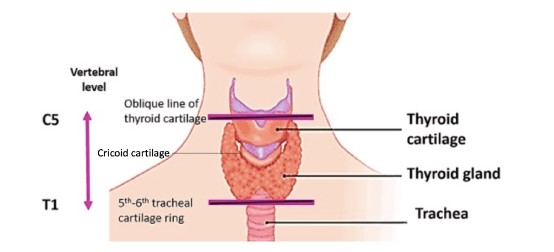Makindo Medical Notes"One small step for man, one large step for Makindo" |
|
|---|---|
| Download all this content in the Apps now Android App and Apple iPhone/Pad App | |
| MEDICAL DISCLAIMER: The contents are under continuing development and improvements and despite all efforts may contain errors of omission or fact. This is not to be used for the assessment, diagnosis, or management of patients. It should not be regarded as medical advice by healthcare workers or laypeople. It is for educational purposes only. Please adhere to your local protocols. Use the BNF for drug information. If you are unwell please seek urgent healthcare advice. If you do not accept this then please do not use the website. Makindo Ltd. |
Thyroid Physiology
-
| About | Anaesthetics and Critical Care | Anatomy | Biochemistry | Cardiology | Clinical Cases | CompSci | Crib | Dermatology | Differentials | Drugs | ENT | Electrocardiogram | Embryology | Emergency Medicine | Endocrinology | Ethics | Foundation Doctors | Gastroenterology | General Information | General Practice | Genetics | Geriatric Medicine | Guidelines | Haematology | Hepatology | Immunology | Infectious Diseases | Infographic | Investigations | Lists | Microbiology | Miscellaneous | Nephrology | Neuroanatomy | Neurology | Nutrition | OSCE | Obstetrics Gynaecology | Oncology | Ophthalmology | Oral Medicine and Dentistry | Paediatrics | Palliative | Pathology | Pharmacology | Physiology | Procedures | Psychiatry | Radiology | Respiratory | Resuscitation | Rheumatology | Statistics and Research | Stroke | Surgery | Toxicology | Trauma and Orthopaedics | Twitter | Urology
Related Subjects: |Thyrotoxicosis and Hyperthyroidism |Thyroid Storm - Thyrotoxic crisis |Graves Disease (Thyrotoxicosis) |Amiodarone and Thyroid disease |Thyroid Surgery (Thyroidectomy) |Hypothyroidism |Hashimoto's thyroiditis |DeQuervain's thyroiditis |Subacute Thyroiditis |Thyroid nodule |Congenital Hypothyroidism |Thyroid Function Tests and antibodies |Post partum thyroiditis |Sick Euthyroid Syndrome |Thyroid Exam (OSCE) |Thyroid Gland anatomy and Physiology |Thyroid Cancer
🦋 The thyroid trap is an ATP-driven iodide pump in the basal plasma membrane of follicular cells. It transports iodine against its gradient into the colloid, where thyroglobulin (rich in tyrosine residues) undergoes iodination by thyroid peroxidase. The thyroid gland is a vital endocrine organ in the neck, producing T4 (thyroxine) and T3 (triiodothyronine), key regulators of metabolism, growth, and development.
📍 Anatomy of the Thyroid Gland
- Located in the anterior neck, just below the larynx.
- Two lobes connected by an isthmus.
- Made of follicles filled with colloid containing thyroglobulin.
⚙️ Synthesis of Thyroid Hormones
- Iodine Uptake: Sodium-iodide symporter brings iodine into follicular cells.
- Thyroglobulin Production: Synthesised in follicular cells → secreted into colloid.
- Iodination & Coupling:
- Iodine + tyrosine residues → MIT (monoiodotyrosine) & DIT (diiodotyrosine).
- MIT + DIT → T3 ; DIT + DIT → T4.
- Storage & Release: T3/T4 bound to thyroglobulin in colloid → released after endocytosis & proteolysis on TSH stimulation.
🎛 Regulation of Thyroid Hormone Production
- Hypothalamic-Pituitary-Thyroid Axis:
- Hypothalamus: TRH → stimulates pituitary.
- Pituitary: TSH → stimulates thyroid.
- Negative feedback: T3/T4 inhibit TRH & TSH release.
🔥 Actions of Thyroid Hormones
- Metabolism: ↑ BMR, ↑ ATP production, ↑ heat generation, ↑ carb/lipid turnover.
- Growth & Development: Crucial for CNS maturation 👶 and bone growth.
- Cardiovascular: ↑ HR, ↑ cardiac output via ↑ sensitivity to catecholamines ❤️.
- CNS: Influences mood, cognition, alertness 🧠.
🧪 Thyroid Function Tests
- Serum TSH: Best screening tool. ↑ in hypothyroidism, ↓ in hyperthyroidism.
- Free T4: Measures unbound thyroxine (direct hormone status).
- Free T3: Helpful in suspected hyperthyroidism.
- Thyroid Antibodies:
- Anti-TPO → Hashimoto’s thyroiditis.
- TSI (TSH receptor Ab) → Graves’ disease.
🏥 Clinical Relevance
- Hypothyroidism: Low T3/T4.
- Symptoms: Fatigue, weight gain, cold intolerance ❄️, constipation, depression.
- Causes: Hashimoto’s, iodine deficiency, drugs (e.g. lithium, amiodarone).
- Hyperthyroidism: Excess T3/T4.
- Symptoms: Weight loss, heat intolerance ☀️, tremor, palpitations, anxiety.
- Causes: Graves’ disease, toxic multinodular goitre, thyroiditis.
📝 Summary
The thyroid gland regulates energy, growth, and development via T3 and T4. Hormone synthesis depends on iodine uptake, thyroglobulin iodination, and TSH control. Disorders include hypothyroidism and hyperthyroidism, diagnosed with TSH, T4, and antibody tests.
